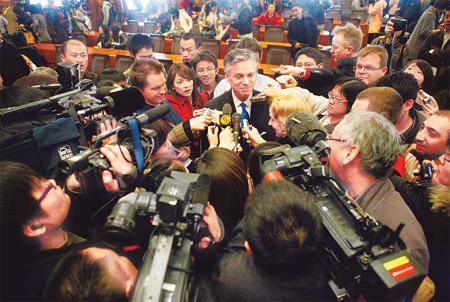Get Flash Player
Video: Section Two
 Washington s ambassador to Beijing Jon Huntsman is the focus of media attention after delivering a speech on Sino-US relations at Beijing s Tsinghua University on Thursday.[Yang Shizhong/China Daily]
Washington s ambassador to Beijing Jon Huntsman is the focus of media attention after delivering a speech on Sino-US relations at Beijing s Tsinghua University on Thursday.[Yang Shizhong/China Daily]
US envoy says 'important talks' will be held soon
Beijing: The top US envoy to China on Thursday expressed confidence that the two countries will find a solution to the yuan exchange rate.
"I think in due time, it will be resolved to the satisfaction of both parties," Ambassador Jon Huntsman told an audience of students at the prestigious Tsinghua University.
The two sides are expected to hold "important negotiations" over the exchange rate in the coming weeks, he said, adding that the US Treasury will take long-term trade relations into account when deciding on the issue.
Some US politicians have long criticized China for "deliberately keeping its currency undervalued".
On Tuesday, five senators proposed imposing stiff penalties against China if it refuses to revalue its currency. The move came after 130 congressmen wrote a letter demanding the Barack Obama administration take action to force China to raise the value of the yuan.
The US Treasury has the option of declaring Beijing a currency manipulator in a report due out next month, which could set the stage for possible tariffs on Chinese goods.
Beijing has so far showed no signs of budging, saying it will stick to a stable exchange rate. Officials also said the country has been made a "scapegoat" for the US' own economic woes prior to Congressional mid-term elections.
Foreign Ministry spokesman Qin Gang reiterated at a regular briefing on Thursday that the yuan's exchange rate is not the main cause of the US trade deficit with China, and that Washington's demands for a stronger yuan were "unfair and harmful" to Sino-American ties.
To resolve trade friction, "both sides should remain calm and rational", Qin said.
On the same day, a Chinese semi-official trade group said a stronger yuan will spell the end for many Chinese exporters in labor-intensive sectors such as garments and furniture.
"If the yuan rises, these companies will face the immediate risk of going bust as their profit margin is already very narrow," said Zhang Wei, vice-chairman of the China Council for the Promotion of International Trade.
"So for these companies, the consequences would be disastrous," he told a news conference.
While external pressure on China to push up the yuan is intense, domestic pressure to hold the currency down is even greater, said Zhang, whose members include the country's biggest exporters.
He said his group was checking with more than 1,000 exporters on whether they could cope with a stronger exchange rate.
Huntsman also tried to strike a conciliatory tone, saying disputes should not impede cooperation on global issues such as climate change.
Such differences "cannot, must not, prevent the two countries from working together to create jobs, address climate change, and prevent Iran from developing a nuclear weapons capability," he said.
"To put our relationship on a more stable and mature footing, we have to delink our differences on bilateral issues from our cooperation on global issues, including nonproliferation," he said.
Huntsman expressed confidence in the resilience of ties.
"I've seen enough ups and downs to know that the recent turbulence we've experienced is part of a natural cycle our relationship is mature and stable enough to weather our differences," Huntsman said, adding that he believed "blue skies are already on the horizon".
Qin responded by saying that "we hope there are always blue skies and sunshine in the Sino-US relationship. Both sides have to make efforts to disperse the dark clouds".
Qin said he hoped Huntsman's comments on better relations are "translated into concrete actions", adding that the two sides should respect each other's core interests.
Some global organizations and economists share China's stand on the exchange rate.
The burden of rebalancing the global economy should not be put on a single country and its currency, the UN Conference on Trade and Development said on Tuesday.
"Expecting that China will leave its exchange rate to the mercy of totally unreliable markets and risk a Japan-like appreciation shock ignores the importance of its domestic and external stability for the region and for the globe," the UN agency said in a policy brief.
A loss in China's competitiveness as a result would produce dangerous consequences for the world, it said.
British economist Liam Halligan said Obama "is playing with fire" when pressing China to revalue its currency.
"Obama really should tread carefully. At the same time, the United States is now at risk of sparking what could be an all-out trade war," he said in an article in the Sunday Telegraph.
Jin Canrong, associate dean of Renmin University of China's school of international relations, said both China and the US should restrict their scale of reaction to disputes.
He said cooperation and differences co-exist in Sino-US relations, which will last for a long time.
AP, Reuters contributed to the story





